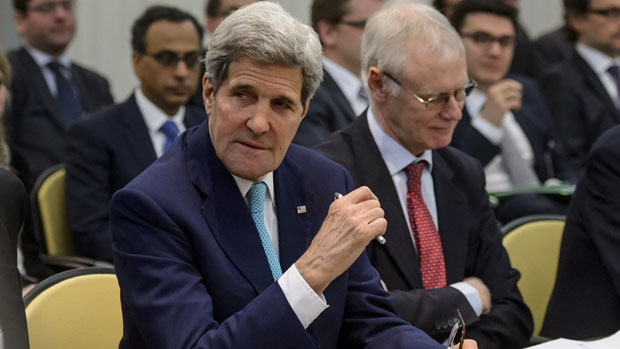Iran nuclear talks: 'tricky issues' remain as deadline looms
Deal to curb Iran's ability to build a nuclear bomb could 'scarcely be more sensitive or difficult'

A free daily email with the biggest news stories of the day – and the best features from TheWeek.com
You are now subscribed
Your newsletter sign-up was successful
US Secretary of State John Kerry has warned that there are "still some tricky issues" to resolve as the deadline for an Iran nuclear deal looms.
Negotiators from the US, Britain, China, France, Russia and Germany have been trying to hammer out a political framework before midnight on Tuesday to curb Iran's ability to build a nuclear weapon in return for sanctions relief.
Last night in Lausanne, Switzerland, where the talks are taking place, Kerry said there had been a "little more light", but added "there are still some tricky issues".
The Week
Escape your echo chamber. Get the facts behind the news, plus analysis from multiple perspectives.

Sign up for The Week's Free Newsletters
From our morning news briefing to a weekly Good News Newsletter, get the best of The Week delivered directly to your inbox.
From our morning news briefing to a weekly Good News Newsletter, get the best of The Week delivered directly to your inbox.
BBC's Ben Bland says the deal could "scarcely be more sensitive or difficult". Negotiations have been going on for 18 months following a lengthy stand-off between Iran and the West.
British Foreign Secretary Philip Hammond said it was "in everybody's interest" to reach a deal, but added that any agreement had to put the bomb beyond Iran's reach. "There can't be any compromise on that," he said.
The central problems are said to be the length of restrictions on Iran's nuclear activities and how quickly the UN sanctions would be removed, as well as the penalties available if Iran fails to comply.
Iran has accepted strict limits on its development of new superefficient centrifuges during the first ten years of a deal, says The Guardian, but has refused to extend the restrictions for a further five years, arguing that it would render itself dependent on foreign technology.
A free daily email with the biggest news stories of the day – and the best features from TheWeek.com
It also wants all UN Security Council sanctions lifted, but the international community says it must first be convinced that Iran has no intention of pursuing a weapons programme.
"At this moment of impasse, the brinkmanship is beginning to show," says The Guardian.
David E Sanger, at the New York Times, says that essentially three deals need to take place: one between the West and Iran, which he says is probably the easiest; one between President Barack Obama and Congress, which is becoming increasingly difficult; and one between the Iranian negotiators and the country's Ayatollahs and military, which may be "impossible".
-
 The ‘ravenous’ demand for Cornish minerals
The ‘ravenous’ demand for Cornish mineralsUnder the Radar Growing need for critical minerals to power tech has intensified ‘appetite’ for lithium, which could be a ‘huge boon’ for local economy
-
 Why are election experts taking Trump’s midterm threats seriously?
Why are election experts taking Trump’s midterm threats seriously?IN THE SPOTLIGHT As the president muses about polling place deployments and a centralized electoral system aimed at one-party control, lawmakers are taking this administration at its word
-
 ‘Restaurateurs have become millionaires’
‘Restaurateurs have become millionaires’Instant Opinion Opinion, comment and editorials of the day
-
 Will increasing tensions with Iran boil over into war?
Will increasing tensions with Iran boil over into war?Today’s Big Question President Donald Trump has recently been threatening the country
-
 Epstein files topple law CEO, roil UK government
Epstein files topple law CEO, roil UK governmentSpeed Read Peter Mandelson, Britain’s former ambassador to the US, is caught up in the scandal
-
 Iran and US prepare to meet after skirmishes
Iran and US prepare to meet after skirmishesSpeed Read The incident comes amid heightened tensions in the Middle East
-
 Which way will Trump go on Iran?
Which way will Trump go on Iran?Today’s Big Question Diplomatic talks set to be held in Turkey on Friday, but failure to reach an agreement could have ‘terrible’ global ramifications
-
 Israel retrieves final hostage’s body from Gaza
Israel retrieves final hostage’s body from GazaSpeed Read The 24-year-old police officer was killed during the initial Hamas attack
-
 China’s Xi targets top general in growing purge
China’s Xi targets top general in growing purgeSpeed Read Zhang Youxia is being investigated over ‘grave violations’ of the law
-
 Panama and Canada are negotiating over a crucial copper mine
Panama and Canada are negotiating over a crucial copper mineIn the Spotlight Panama is set to make a final decision on the mine this summer
-
 Iran unleashes carnage on its own people
Iran unleashes carnage on its own peopleFeature Demonstrations began in late December as an economic protest